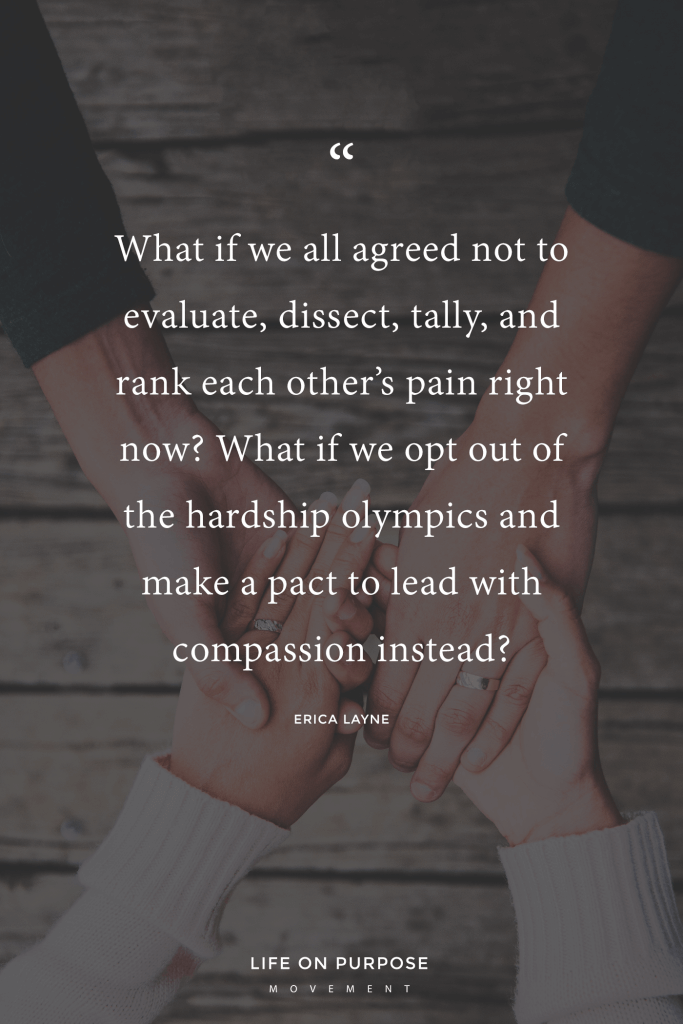Have you ever been trapped in a conversation with someone who is trying to one up you with the struggles of their life?
You know, you have been battling a cold for 3 weeks; theirs lasted for 5. You just found out your partner has been having an affair; their partner did it to them 3 times ~ each time with their best friend or sister.
Perhaps, you found yourself sharing a trying time with someone. You’ve had it rough for a while now and you were just hoping to unload a little bit and feel a sense of comfort.
No sooner do you begin to speak when your friend starts talking about how it was for them when they went through the same thing 15 years ago. You know deep down inside that your friend’s intentions are good ~ they want you to know that they can relate. They understand where you are coming from. You tell yourself this to get past the little bit of irritation that is beginning to brew in your belly.
When your friend goes a step further and starts describing in detail how much worse their experience was than what’s going on for you, you’re about ready to lose your cool, but you bite your tongue.
Tit for Tat
In utter frustration now, you begin to play the same game. Before you know it, you have given one example after another of why your challenges are so much more difficult and horrible than what your friend is describing.
Suddenly, you realize that you have fallen down a rabbit hole ~ the slippery slope ~ of fighting for your suffering.
I have caught myself in those moments more times than I like to admit ~ on both sides of the fence to be honest.
What is it that makes us so intent on proving that our suffering has been worse than anything anyone else has experienced? What makes us so intent on holding on to the stuff that hurts, just embedding that much more deeply into our hearts?
Maybe, it has something to do with our ability to embrace it inside our own hearts. Who really needs to witness our pain? Could it be that it’s more important that I observe my own pain than it is to receive validation from someone else?
Deflecting Recognition
I have found myself in a similar scenario when it comes to identifying with my “shortcomings.” Someone offers me a compliment and I begin listing all the reasons why it isn’t true. I find ways to minimize their observation. I do my best not to embrace whatever amazing quality they have just acknowledged. I downplay it ~ ascribe it to something or someone else ~ and in a multitude of ways I dishonor the gift that they just bestowed on me.
Would it really hurt to just say, “thank you?” And then sit quietly with the gift and take it in.
What if we could cling just as tightly to the possibility of our greatness and the potential for wonderful and joyful things happening for us? I bet that life would feel so much more peaceful.
Could it be that we reject ownership of our greatness because we know our acceptance of our gifts means we will be called upon to use them ~ and that scares us to death.
Comparison Kills Community
At this time in our world, like any other time that involves struggle and suffering, there can be a desire to compare our situation to others in order to feel better. But, have you ever noticed that no matter how much worse it may seem to be for someone else, at the end of the day, you are still the only one who can walk the difficult path before you.
When we fight to validate our suffering ~ or others’ suffering ~ we run the risk of becoming identified with it. This is a debilitating energetic force in our lives, robbing us of our capacity to hold a larger vision of the possibilities.
Comparison often leads to disunity and disconnection. Compassion and empathy for self and others creates a greater opportunity for connection and community. Focus on the capacity we hold for growth, learning, and healing offers a spirit of encouragement and optimism that can bolster us in the difficult times without minimizing our own personal experience and that of other people.
Let’s stop trying to get the corner on the suffering and shortcomings market. This is not a competition that we want to win. And the perceived rewards are fool’s gold. Suffering and struggling for attention, sympathy, and importance all lead down the path of drama. That’s an exhausting road to travel that leaves us depleted, bitter and hopeless.
We can acknowledge and embrace the pain and difficulty that life offers without making it our story and we can likewise, transcend it without minimizing or bypassing its impact. It’s a delicate balance ~ but isn’t that the nature of this human experience?
Another instalment in the Conscious Service Series for Helping Professionals and Personal Caregivers.


